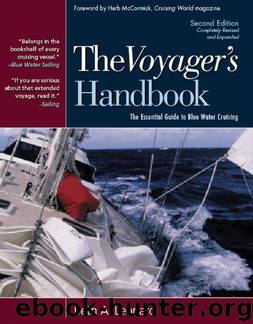The Voyager's Handbook: The Essential Guide to Blue Water Cruising by Beth Leonard

Author:Beth Leonard [Leonard, Beth]
Language: eng
Format: epub
Publisher: McGraw-Hill Education
Published: 2006-11-15T23:00:00+00:00
Money Matters
One of the areas where life has gotten markedly easier aboard a cruising boat is in managing money in all its many aspects: income, cash, bill payments, taxes, and so on. Almost all these things can now be handled internationally with little more hassle than it would take to handle them while traveling in your home country. There are quite a few things you can do to ensure that your money management is worry free. For the most part, these do not require the help of paid professionals. You can get cash, pay your bills, collect your income, and pay your taxes electronically. But if you are leaving behind a business, real estate, or complex financial affairs, entrust the details to someone reliable even if you have to hire their services. One round-trip ticket from Fiji pays for a lot of professional assistance, so the trade-off makes sense if managing your affairs will take more than a few hours each week.
Cash and Credit Card Management
If we were to list the things that have made cruising easier for us over the course of more than a decade on two boats, ATM machines and debit cards would be somewhere near the top. Cruisers used to carry large quantities of cash and traveler’s checks on board, enough for at least six months of cruising. That money had to be exchanged for local currency at a bank or foreign exchange kiosk. A couple of times a year we had to get hold of a large quantity of U.S. dollars. Today we go ashore, find an ATM, pull out our debit card, and draw cash in the local currency directly from our bank account.
However, we have started to pay a steep price for this convenience. In 2005 most U.S. banks began charging a foreign exchange fee on every international transaction using a debit or a credit card. These fees range from 2 to 4 percent of the transaction amount, so they add up very quickly. When organizing for offshore, then, read the fine print on your bank cards carefully. Try to find a bank that charges less or negotiate a break on these fees based on your other balances. If you can’t find a way around them, make sure to factor in the extra costs you will incur.
If you plan to spend six months or more in one country, one way to avoid the foreign exchange fees is to open a local account and get a local debit card. Setting up the account can be challenging. The least expensive way to do it is to write a check or wire-transfer the funds, though either way you will incur fees. To transfer funds electronically, you will need to establish a wire-transfer agreement with your bank before you leave. Then all you should need to do is to fax the foreign bank’s routing information to your bank along with a signed authorization. But don’t leave it at that. Find out how long the transfer should take and then follow up.
Download
This site does not store any files on its server. We only index and link to content provided by other sites. Please contact the content providers to delete copyright contents if any and email us, we'll remove relevant links or contents immediately.
The River by Peter Heller(2331)
Breath by James Nestor;(2297)
Sea Survival Handbook by Keith Colwell(2241)
Fatal Storm by Rob Mundle(2213)
Deep by James Nestor(2174)
Lonely Planet Australia by Lonely Planet(2077)
Iced In by Chris Turney(1998)
Discover Australia by Lonely Planet(1944)
Lonely Planet Maldives (Travel Guide) by Planet Lonely & Masters Tom(1849)
FOR THE LOVE OF THE SEA by Bohnet Jennifer(1782)
One Girl One Dream by Dekker Laura(1677)
Looking for a Ship by John McPhee(1674)
Ten Degrees of Reckoning: The True Story of a Family's Love and the Will to Survive by Hester Rumberg(1645)
Chicken Soup for the Ocean Lover's Soul by Jack Canfield(1636)
Lonely Planet Australia (Travel Guide) by Lonely Planet & Lonely Planet(1588)
South with the Sun by Lynne Cox(1585)
The Wave In Pursuit of the Rogues, Freaks and Giants of the Ocean(1544)
Diver Down by Michael Ange(1504)
Marlinspike Sailor's Arts and Crafts by Barbara Merry(1487)
